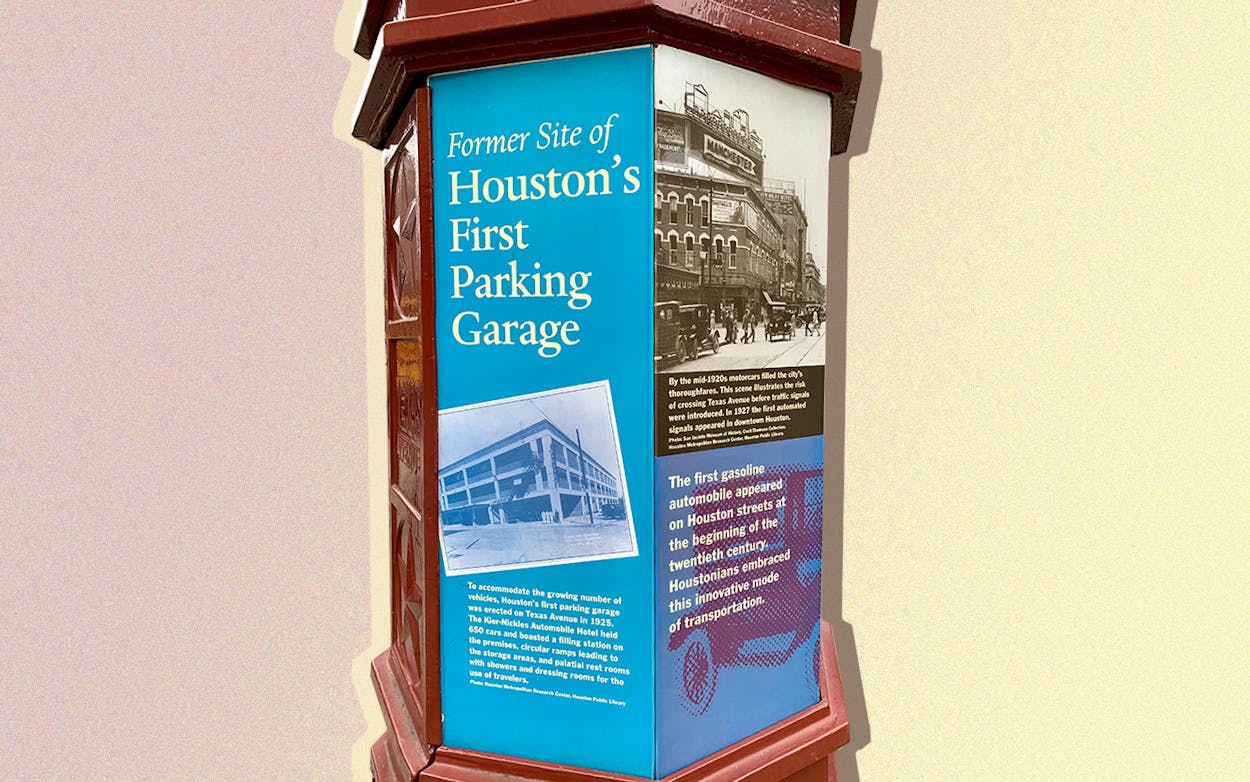This sign not only commemorates a “historic” parking garage, something that seems it could only happen in Houston—it commemorates one that has been torn down!
Whining about traffic and parking and wondering what used to be on any given corner are right up there among Houstonians’ favorite pastimes, rivaling telling people how “Dallas sucks” in every possible way and how Houston is much, much weirder than Austin could ever dream of being. It’s what we do best. It’s in our civic DNA.
History should tell us something about who we are based on knowing who we were, and this marker does just that. It tells us that ever since the dawning of the automobile age, Houstonians have craved convenient parking, and here dwelled patient zero of what would become a serious epidemic, one that has alarmed, dismayed, and astonished urban planners ever since. Houston, wrote one, had allowed itself to become “All parking, no city.”
The features of this particular parking garage illustrate the decline of parking garages since the Kier-Nickles Auto Hotel opened in 1925, a downward trend that oddly mirrors commercial air travel. In contrast to the utilitarian, downright frightening parking garages of the past few decades, this one had some sweet touches.
First, it was thought of as a hotel—for cars.
Second, according to an ad announcing its opening, it featured a “palatial ladie’s rest room [sic],” “the first of its kind in the South,” “with showers, dressing rooms, writing tables, soft divans, and a homy fireplace [that] will ease the tired traveller after a hard cross-country trip.” That was in addition to a filling station and a car wash onsite—throw in some grab-and-go sandwiches and kolaches and some branded swag, and you have a weird, urban, multistory Buc-ee’s prototype.
Turns out, local historian Betty Chapman created the monument as one of 60 in a blocks-long open-air historical exhibit she curated on storied Texas Avenue twenty years ago. In a Facebook exchange over the weekend, Chapman told me that my take on the monument—that it lamented a lost treasure—was all wrong. Chapman, who has an encyclopedic knowledge of Houston’s history, simply deemed the parking garage one of the most interesting structures to have stood on that particular block of Texas Avenue; she included it to teach about the early days of Houston’s love affair with the automobile. Nothing more, nothing less.
“It was not indicating that building should have been preserved,” she wrote. “Heavens no! Preservation was not involved in this at all.”
The lost parking garage of Texas Avenue set me to wondering: What historical monument best captures the essence of a Texas town, or what fitting new monument would you propose? Let us know what you think in the comments below or on social media using the hashtag #mosttexasmonument.
- More About:
- Texas History
- Architecture
- Houston







